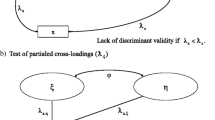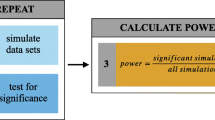Abstract
The recombinant estimation technique of Mullin and Reiley (2006) can be a useful tool for analyzing data from normal-form games. The recombinant estimator falls within a general category of statistics known as U-statistics. This classification has both theoretical and practical implications: (1) the recombinant estimator is optimal (minimum variance) among unbiased estimators, (2) there is a computationally simple method for computing its asymptotic standard error, and (3) the estimation technique can be extended to multiple outcomes and to other types of inferential procedures commonly used for experimental data, such as the sign test. Simulation evidence suggests that researchers should use the asymptotic standard error rather than the standard error of Mullin and Reiley (2006) since the latter exhibits a downward bias.
Similar content being viewed by others
References
Apesteguia, J., Dufwenberg, M., & Selten, R. (Forthcoming), Blowing the whistle. Economic Theory.
Chen, Y., & Sönmez, T. (2002). Improving efficiency of on-campus housing: an experimental study. American Economic Review, 92, 1669–1686.
Chen, Y., & Sönmez, T. (2006). School choice: an experimental study. Journal of Economic Theory, 127, 202–231.
Dufwenberg, M., Gneezy, U., Goeree, J. K., & Nagel, R. (Forthcoming). Price floors and competition. Economic Theory.
List, J., & Lucking-Reiley, D. (2000). Demand reduction in multi-unit auctions: evidence from a sportscard field experiment. American Economic Review, 90, 961–972.
Mehta, J., Starmer, C., & Sugden, R. (1993). The nature of salience: an experimental investigation of pure coordination games. American Economic Review, 84, 658–673.
Mitzkewitz, M., & Nagel, R. (1993). Experimental results on ultimatum games with incomplete information. International Journal of Game Theory, 22, 171–198.
Mullin, C. H., & Reiley, D. (2006). Recombinant estimation for normal-form games with applications to auctions and bargaining. Games and Economic Behavior, 54, 159–182.
Serfling, R. J. (1980). Approximation theorems of mathematical statistics. John Wiley & Sons.
van der Vaart, A. W. (1998). Asymptotic statistics. Cambridge University Press.
Author information
Authors and Affiliations
Corresponding author
Additional information
JEL Classification C12, C90
Although the idea of recombinant estimation appears previously in the literature (for example, Mitzkewitz and Nagel (1993) and Mehta et al. (1994)), Mullin and Reiley (2006) is the first attempt at formalizing the econometric methodology and proposing a method for standard-error calculation.
Rights and permissions
About this article
Cite this article
Abrevaya, J. On recombinant estimation for experimental data. Exp Econ 11, 25–52 (2008). https://doi.org/10.1007/s10683-006-9155-8
Revised:
Accepted:
Published:
Issue Date:
DOI: https://doi.org/10.1007/s10683-006-9155-8




